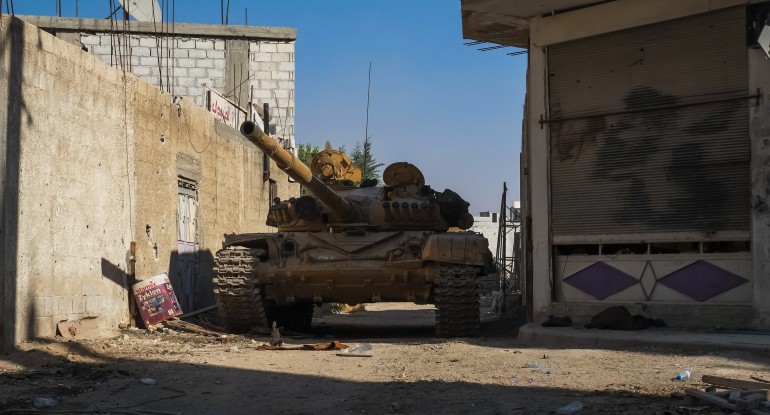Angelo Codevilla, who has some of the most interesting things to say about America has a new column out in Asia Times.
For more than a quarter century, as Americans have suffered trouble from the Muslim world’s Sunni and Shia components and as the perennial quarrel between them has intensified, the US government has taken the side of the Sunni. This has not worked out well for us. It is past time for our government to sort out our own business, and to mind it aggressively.
To understand why hopes for help from the Sunni side are forlorn, we must be clear that jihadism in general and Daesh in particular are logical outgrowths of Wahhabism, Saudi Arabia’s (and the Gulf monarchies’) official religion, about how they fit in the broader conflict between Sunni and Shia, as well as about how the US occupation of Iraq exposed America to the vagaries of intra-Muslim conflicts.
I have believed this for some time and am happy to see him agree with me. I spent an evening listening to him talk about our foreign policy and how the War on Terror became a war on Americans.
The U.S. government does not understand how to combat international terrorism or respond to its threats. In an exclusive interview with Ginni Thomas of The Daily Caller, Codevilla highlighted the failure of both administrations to understand the enemy, explaining that it makes national security decisions based on a flawed paradigm.
“After 9/11, the U.S. government instituted a system of homeland security based on the proposition that any American is as likely as anyone in the world to commit terrorist acts — and that therefore, all Americans must be screened and presumed to be terrorists until the screening clears them,” Codevilla said.
Certainly, the government has been engaged in a faux security system with the TSA that pretends it will stop an airline hijacking or bomb threat, while allowing 90% of false bombs and guns to escape surveillance.
“These people who attacked us had reasons, which are widely supported — in fact, vigorously promoted by the regimes from which they came,” Codevilla said. “The Saudi regime, which we count as an ally, does in fact harbor the most virulent strain of Islam, the Wahhabism. This movement inspired most of the hijackers in 9/11. The others, some of the leaders, were inspired by the Muslim Brotherhood of Egypt, which the Obama administration has been courting and favoring.”
Rather than confronting the movement of Islamic radicalization, Codevilla says that both Barack Obama and George W. Bush blamed acts of terrorism on the perpetrators themselves, instead of viewing them as the incarnations of a murderously ideological movement.
I am a little less conspiracy minded but I agree that we face a militant ideology that is as yet unacknowledged.
US foreign policy in the Middle East had moved to the Sunni side in 1979 after the Shia Islamic Republic’s overthrow of Iran’s secular Shah. For the previous quarter century, the Shah’s Iran had taken care of US interests in the region while muting its Persian Shia people’s perennial tensions with the Sunni Arab world.
But Iran’s Islamic Republic has been as aggressively Shia and Persian as it has been anti-American. Fatefully, rather than answering in kind the Islamic Republic’s warfare on America, all presidents since Jimmy Carter have searched the Sunni Arab world for counterweights to Iran, as well as for the kind of support that the Shah had given us.
This attempt to outsource America’s security concerns by entering into the Sunni-Shia conflict on the Sunni side has been counterproductive because the Sunni, 85% of the Muslim world, are also the nursery of its most contagious plagues — the Wahhabi sect and the Muslim Brotherhood. Above all, it has been disastrous because it has led the US government to lose sight of our own interests by confusing them with those of Sunni states and potentates.
Here, I agree completely. I think Bush’s attempt to see if an Arab country could rule itself was a reasonable thing to try. The disaster was turning the policy over to Arabist Paul Bremer who decided to become a viceroy and alienated the Sunnis of Iraq. Saddam began the crisis by invading Kuwait.
The main Sunni monarchies’ congenital worse-than-uselessness is why, in the decade after Iranian Islamic Republic’s establishment, US policymakers vigorously courted Iraq’s Saddam Hussein, who ruled mostly-Shia Iraq with a bloody hand through its Sunni minority. The US policymakers who helped Saddam prevail in his war against Iran believed that, by so doing, they could strike a blow at Iran while weaning Saddam away from his reliance on the Soviet Union.
Too clever. No sooner had Saddam established his power over the head of the Gulf than he used it to conquer Kuwait, after which the Gulf’s monarchs were helpless before his disciplined army and frightened by their own peoples’ support for Saddam. They asked the United States’ help.
I am a bit skeptical here but he might well be correct. What we have now is a president who has elected to join the Shia and Iranian side in this Muslim civil war.
But instead of choosing any version of America’s own interest, US statesmen confused that interest with the self-contradictory demands of the Saudis, etc. — the Sunni world’s weak reeds: Please, make war on Saddam, but not so hard as to break his Iraqi Sunni empire. This way we can all win without dealing with the consequences of victory. We can have our cake while eating it too.
Our bipartisan ruling class, from the Bush and Clinton families to the Dick Cheneys and Colin Powells to Washington’s think tanks considered this counsel to be sophistication, and themselves to be sophisticates for accepting it. Far too clever.
The ensuing bellum interruptus was meant to tweak the balance among the Mid-East’s Sunni forces. But the result was that Saddam, who’d not been an enemy of the United States, subsequently led the Muslim world to new heights of enmity to America. Few remember that the longest and most impassioned part of Osama bin Laden’s 1996 fatwa which preceded the wave of anti-American terrorism that crested on 9/11 was a denunciation of America’s actions against Saddam’s Iraq.
Here I tend to agree with Codevilla. Clinton was not immune to this misapprehension of our interests. “Foreign Affairs,” a journal that I used to subscribe to, ran a cover story during Bill Clinton’s feckless presidency on “Foreign Policy as Social Work.”
the Sunni states — which had opposed the invasion strenuously — convinced Bush 43 to occupy Iraq indefinitely. That involved taking care of their business. He agreed to confuse others’ business with America’s despite having been elected in part by promising never to engage in “nation building.”
Bush promised to build “a united, democratic Iraq.” That was always an absurdity because, since Iraq’s constituent groups loathed and feared each other, Iraq’s unity could result only from one group’s despotism over the others, whereas “democracy” — i.e. the will of the people — meant that Iraqis would go their separate ways.
The occupation’s day-to-day practical objective however, was to hold the 83% of Iraqis who were not Sunni into a state structure in which the Sunni would salvage at least some of the privileges they had held under Saddam. That is what the Sunni states wanted, and that is what they had convinced the US government was in America’s interest as well. It was also impossible. Immediately, the occupation started a Sunni war on America that is yet to end.
This is an interesting point of view and could explain why Bush chose Bremer over the far more capable Jay Garner.
He has another installment coming this week. I will read it with interest.
Here is a section I agree with.
Turkey’s President Recep Tayyip Erdogan, however, chose to make his country the Islamic State’s indispensable logistical partner out of a welter of reasons and through a calculation of risks that make sense only to him. Erdogan, a Sunni Islamist and member of the Muslim Brotherhood, sees support for Daesh/ISIS as serving his personal and sectarian opposition to Syria’s Bashar al Assad. This, along with his desire to reduce Kurdish enclaves on both sides of the Syria/Turkey border.
The kurds are our only friends, if any, in the middle east except Israel.



